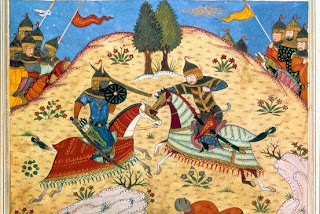 Dick Davis’s English is the closest I’ll ever get to the Persian of Ferdowsi’s famous epic, a multi-volume poem condensed here into a version that leavens the inevitable tedium of the chronicle with a string of well-realized vignettes related in supple, vivid prose, with the occasional rhyming stanza for more festive or elevated moments. In Davis’s translation, each of Ferdowsi’s many kings and heroes miraculously stays distinct, and you get enough of each story—especially the famous Rostam’s—to gain a feel for the aesthetic predilections of classical Persian poetry: the jewels spilling from goblets, the kingly demons, the cypress-slim heroes and raven-haired princesses, the splendiferous banquets, thwarted loves, and shah after shah handing on the regal glow of his farr. Undercutting the bling is Ferdowsi’s insistent warning that glory’s born to fade, and that death meets us all when the wine cup’s dry; a little sour pathos to season the narrative sweet.
Dick Davis’s English is the closest I’ll ever get to the Persian of Ferdowsi’s famous epic, a multi-volume poem condensed here into a version that leavens the inevitable tedium of the chronicle with a string of well-realized vignettes related in supple, vivid prose, with the occasional rhyming stanza for more festive or elevated moments. In Davis’s translation, each of Ferdowsi’s many kings and heroes miraculously stays distinct, and you get enough of each story—especially the famous Rostam’s—to gain a feel for the aesthetic predilections of classical Persian poetry: the jewels spilling from goblets, the kingly demons, the cypress-slim heroes and raven-haired princesses, the splendiferous banquets, thwarted loves, and shah after shah handing on the regal glow of his farr. Undercutting the bling is Ferdowsi’s insistent warning that glory’s born to fade, and that death meets us all when the wine cup’s dry; a little sour pathos to season the narrative sweet.For historians, the Shahnameh is a rare window onto pre-Islamic Persia, as Ferdowsi carefully marshalled the legends and folktales that were diplomatically forgotten at the glittering Muslim courts: “No one has any knowledge of those first days, unless he has heard tales passed down from father to son.” Ferdowsi, who ended his days (and this volume) lamenting how little his efforts brought him, found a way to be distinctly Persian but still a sound Muslim, and his work lives on in the plots of a thousand and one Bollywood films, as well as in this effective translation by the man Penguin’s backflap doesn’t balk to call “the greatest translator of Persian poetry.”





No comments:
Post a Comment